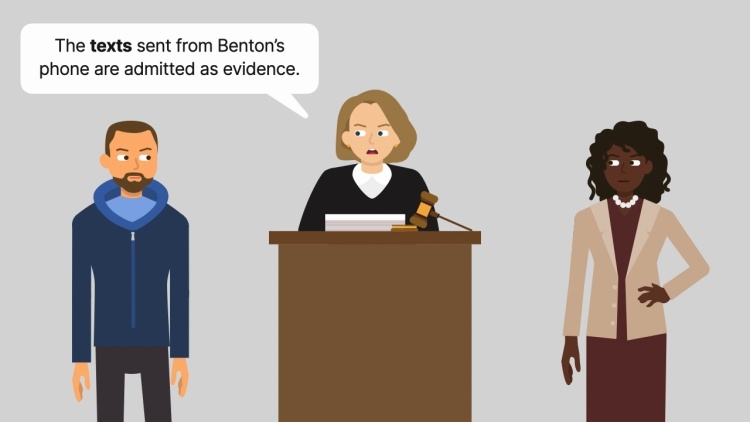State v. Benton
South Carolina Court of Appeals
435 S.C. 250, 865 S.E.2d. 919 (2021)

- Written by Kate Douglas, JD
Facts
Charles Bryant Smith was known to have large amounts of cash. Tommy Lee Benton (defendant) and others decided to rob Smith. On April 18, 2014, Benton and others burgled Smith’s home. On April 26, Benton and others broke into Smith’s store and set it on fire. On April 29, Benton and others broke into Smith’s mobile home, where they handcuffed Smith, assaulted and robbed him, and then set the building on fire, killing Smith. The state charged Benton with murder, burglary, and arson. At Benton’s trial, the state sought to admit incriminating text messages sent from Benton’s phone. For example, on April 26, the date that Smith’s store burned down, Benton sent a text message telling the recipient to meet him at “CB’s furniture outlet.” During times that Benton admittedly possessed his phone, Benton exchanged frequent text messages with his girlfriend, Heather Faircloth, in which he told her that he loved her and talked about their family and engagement. The incriminating text messages were sent around the times Benton exchanged loving messages with Faircloth. The state also sought to admit incriminating Facebook messages extracted from Benton’s phone. The messages were sent to or from the account of Tommy Lee Kruspe. In several instances, Lisa Katlin Rose, the wife of one of Benton’s accomplices, messaged Kruspe about her husband’s role in the crimes. Kruspe’s responses were noncommittal. Rose testified that she thought she was communicating with Benton. However, the state did not adduce any further evidence linking Benton to the Facebook messages or showing that he possessed his phone during the relevant time period. The trial court admitted the messages. The jury convicted. Benton appealed to the South Carolina Court of Appeals, arguing that the trial court erroneously admitted the messages because the state had not properly authenticated them.
Rule of Law
Issue
Holding and Reasoning (McDonald, J.)
What to do next…
Here's why 907,000 law students have relied on our case briefs:
- Written by law professors and practitioners, not other law students. 47,100 briefs, keyed to 996 casebooks. Top-notch customer support.
- The right amount of information, includes the facts, issues, rule of law, holding and reasoning, and any concurrences and dissents.
- Access in your classes, works on your mobile and tablet. Massive library of related video lessons and high quality multiple-choice questions.
- Easy to use, uniform format for every case brief. Written in plain English, not in legalese. Our briefs summarize and simplify; they don’t just repeat the court’s language.





